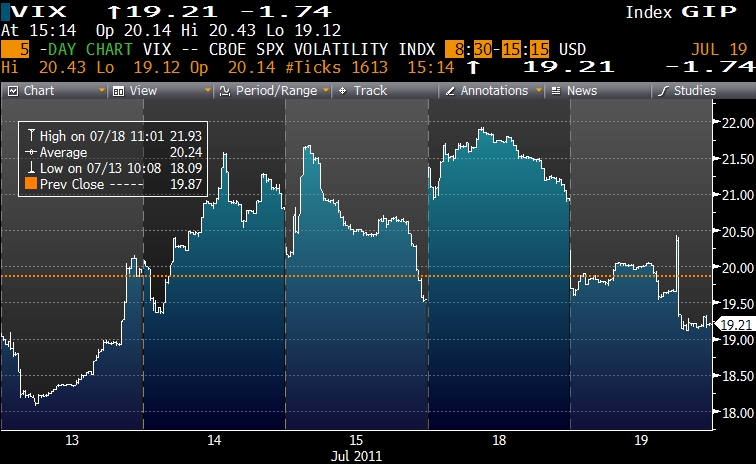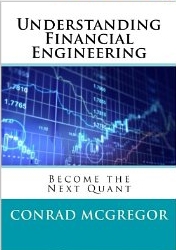Risk Off. Risk On.
This entire year has been marked by range bound US equity markets. It feels like a carnival ride in which the passenger gets extremely anxious as the ride screams down towards the ground and then relaxes until the next fall comes. The VIX is elevated, but not to the point where investors are dumping all holdings, merely floating around “medium discomfort”:
Low and falling interest rates have unnerved me for the last 4 months. With the Fed stopping its QE purchases, why would interest rates fall? With congress squabbling over a meaningless debt ceiling, why would interest rates fall? With corporate earnings so strong, why would interest rates fall? With the printing presses running, why would interest rates fall? It seemed to me that interest rates or equities had to be wrong and I continuously waited for the confirmation from a spiraling equity market.
In March we saw a 6.4% equity market correction and in May/June we saw another 7.2% pullback. Very mild pullbacks that never fell with fury:
My conclusion is either that the equity market is massively delayed in having a strong pullback or it is incredibly resilient. The former could fool me into having an optimistic outlook while the latter could be a signal that investors should be more bullish.
I will take a leap and suggest that things might be better than we think. The recovery has been slow and job growth has been nothing but anemic in the United States. We see the headlines of Europe, see the headlines about US debt, see the headlines about state shutdowns, see the headlines about unemployment, see the headlines about a continued fall in the housing market…it just seems like everything is falling apart. From the standpoint of an investor, it seems like there is nothing good to say. Now that we agree on that, let us think of a couple of facts:
- Read this WSJ article about 70% tax rates. Our budgetary issues are massive and are not going to be solved by taxes. What this means is that the budget will only be fixed by a combination of entitlement cuts, higher taxes AND a debasement of the currency.
- Interest rates are at multi-generational lows. A yield of sub 3% might seem plausible if we expect to march down the Japanese path, but we cannot afford to march down that same path. We have no savings to fund it. If interest rates stay where they are over a long period, then foreign bond buyers are just funding stupidity.
- Despite the abysmal outlook her in the states, corporations continue to make profits around the world. Developing nations are new growth centers, all they need from a US consumer is a semblance of stability.
This implies that the likely, longer term tail event is a strong negative return in US fixed income and a resetting of currencies around the world. US dollar, Euro, and British Pound will get walloped as the currencies of the bankrupt. Chinese Renminbi and other developing nations with strong balance sheets will see their “pegs” become untenable. These are long run facts, not possibilities. The only question is when these future events will come into fruition.
This also means that, regardless of your growth outlook, equities provide protection against currency debasement as well as rising interest rates. Gold can do this as well, but it is very difficult to say whether gold is “rich” or “cheap”. I can say that a stock with an earnings yield of 8% is not overly expensive assuming I believe in some form of earnings stability. I can also say that it does not take much debasement of a currency or spike in inflation to make me wish I never locked in a 3% yield for 10 years.





